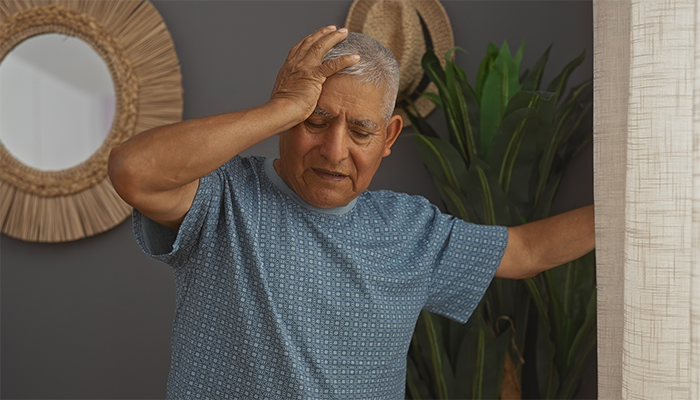
If standing up causes dizziness for your loved one, even simple movements such as getting up from the couch or table can be unpleasant. The problem may be orthostatic hypotension (OH), also called “postural hypotension,” which happens when blood pressure drops suddenly after standing up from sitting or lying down. The resulting dizziness increases the risk of falls.
According to the Mayo Clinic, treatment should look beyond the low blood pressure to the root cause. Once the root cause is under treatment, you can help your loved one adopt some lifestyle changes to help prevent or manage their OH symptoms.
First, get a thorough diagnosis. Make the doctor aware of your relative’s symptoms. They may then run a number of tests for underlying causes. The list of possibilities is long and includes high blood pressure, diabetes, heart disease, and vitamin B12 deficiency. Each of these requires treatment. Also, some medications contribute to OH by lowering blood pressure. Common culprits include diuretics, blood pressure medications, and certain antidepressants. Have your loved one’s medication list reviewed for potential side effects.
Learn practical steps for ongoing management. After identifying the root cause of your relative’s OH, the doctor will likely suggest taking some self-care steps. Following are some commonly recommended lifestyle changes:
- Slow movements. Sudden upward movements can trigger OH. Have your loved one wriggle and stretch their legs and feet before getting up. Then sit up slowly, pause, and stand gradually. If they still feel dizzy, they should sit or lie down until it passes.
- Proper hydration. One of the easiest ways to prevent OH is to stay hydrated. Typically, this means drinking six to eight glasses of water throughout the day. Check with the doctor if your relative prefers other fluids. Limiting alcohol is also important.
- Compression stockings. Depending on the root cause of your relative’s OH, these could be helpful. They can improve blood flow and reduce OH symptoms by applying gentle pressure to the legs.
- Safe environment. Falls are a major concern with dizziness! Remove trip hazards such as loose rugs, keep walkways clear, and make sure there’s adequate lighting, especially at night. In the bathroom, install grab bars and use nonslip mats.
Being proactive and making small changes can improve your loved one’s daily life with OH.